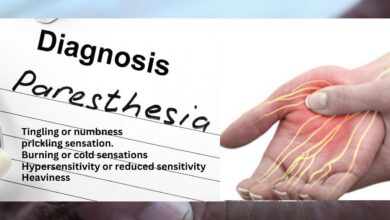Understanding Stroke and Brain Health

A devastating medical event, a stroke can impact brain function for years to come. A disruption in blood flow to the brain causes this condition, which in turn can harm or kill brain cells. Anyone can have a stroke, and the effects can be devastating; thus, it is critical to understand the link between brain health and stroke prevention. Learn about the symptoms, causes, and ways to enhance brain health following a stroke in this post. In addition, we will provide you some practical advice on how to lower your risk and keep your brain in good shape.
A Stroke: What Is It?
A blockage in blood flow to the brain or the burst of a blood artery in the brain causes a stroke. Ischaemic stroke and hemorrhagic stroke are the two most common forms of this medical emergency. A blocked blood artery supplying the brain causes an ischaemic stroke. When a brain vessel bursts, resulting in internal or external bleeding, this condition is known as a hemorrhagic stroke.
Neurological Impact of a Stroke
Brain tissue in the region struck by a stroke can sustain damage. Movement, speech, and memory are just a few of the many bodily processes that the brain regulates. Depending on the area of the brain that was damaged, those who have survived a stroke may go through:
Difficulty with speaking: Language and speech skills are frequently impacted by a left hemisphere stroke.
Muscle weakness or paralysis: A stroke can weaken or paralyse the muscles on one side of the body, most often the face, arms, or legs.
Loss of memory: People who have survived a stroke may have trouble retaining new information or recalling previously learnt material.
Changes in mood: Stroke can affect the body’s ability to regulate its own mood, which can cause changes in mood such as anger, sadness, or worry.
In order to address the connection between stroke and brain health, it is essential to understand these impacts. Brain injuries are typically permanent, however many patients are able to regain some function with prompt medical attention and rehabilitation.
Potential Causes of a Stroke
The chance of having a stroke can be raised by a number of things. Although some of these cannot be changed, others may. By being aware of these dangers, people can safeguard their brain health and reduce their chances of having a stroke.
Risk Factors That Can Be Managed
Stroke is most commonly caused by hypertension, or high blood pressure. Medications, a balanced diet, and regular exercise can help you control your blood pressure and lower your risk.
The risk of blood clots developing in the arteries that supply blood to the brain is increased when a person smokes.
High blood sugar levels can damage blood arteries over time, increasing the risk of stroke for people with diabetes.
Elevated cholesterol levels: Ischaemic strokes are more likely to occur when cholesterol builds up in the arteries and causes blockages.
Unmanageable Dangers
Age: After 55 years of age, the risk of stroke rises even more.
Your chance of having a stroke may be increased if you have a close relative who has experienced one.
For both sexes, the risk of stroke is higher in males, but the mortality rate is higher in women.
Disparities in healthcare and hereditary predisposition put some racial and ethnic groups at a higher risk.
Brain Recuperation Following a Stroke
Rehabilitating after a stroke and engaging in activities that promote brain health are crucial to a speedy recovery. An idea known as neuroplasticity describes the brain’s resiliency and its ability to reorganise itself. The goal of rehabilitation is to help patients restore lost skills and strengthen existing brain connections.
Health Promotion through Physical Activity
Restoring strength and mobility after a stroke often requires physical therapy. Essential are exercises that help with balance and coordination. The following can benefit from physical therapy:
Fortification: restoring fortification to afflicted limbs.
Balance: enhancing coordination to lessen the likelihood of falls.
Assisting with mobility is making it easier to walk, move around, and change positions.
Recuperation may be facilitated by these pursuits since they stimulate the brain. Consistent work, however time-consuming, can yield substantial results.
Rehabilitating Cognitive Function
Cognitive abilities including memory, focus, and problem-solving can be negatively impacted after a stroke. Cognitive rehabilitation aims to enhance these abilities through a range of methods, such as:
Memory exercises: enhancing memory through the use of activities such as word games and puzzles.
Activities that require concentration, such as counting or sorting, can help you concentrate better.
work that requires solving problems: Solving real-life situations to hone decision-making and critical-thinking skills.
Participating in cognitive rehabilitation on a regular basis helps many stroke survivors regain cognitive function. The objective is to facilitate the brain’s adaptation and restoration of maximum function.
Adjustments to Daily Routines to Promote Brain Wellness
Making significant modifications to one’s way of life is frequently necessary to promote brain health after a stroke and to reduce the risk of another stroke. In addition to enhancing general brain health, these alterations lessen the likelihood of future strokes.
A Healthy Diet for the Brain
Protect yourself from stroke and help your brain heal with a healthy, well-balanced diet. The following foods are essential for brain health:
Antioxidants and vitamins found in fruits and vegetables aid in cell protection in the brain.
Proper blood flow to the brain is essential for brain health, and whole grains can aid with that.
Omega-3 fatty acids, which are present in nuts and fish, help the brain work better and lower inflammation.
Reduce your consumption of saturated fats and salt to lessen your risk of stroke by lowering your blood pressure and cholesterol.
If you want to reduce your risk of future strokes and improve your brain health in the long run, these dietary modifications are a must.
Maintain an Exercise Routine
Another key aspect in keeping the brain healthy and preventing strokes is engaging in regular physical activity. Physical activity is beneficial:
Better blood flow: When you work out, more blood goes to your brain.
Regular exercise lowers blood pressure, which in turn lowers the risk of stroke.
Anxieties and despair are common after a stroke, but exercise might alleviate some of those symptoms by releasing endorphins.
The long-term effects on brain health from moderate exercise, such walking, swimming, or yoga, are substantial.
Mental and Emotional Assistance
Following a stroke, mental health becomes even more critical than physical health. With the correct help, it is possible to manage common mental health issues including depression, anxiety, and frustration.
Signing Up for Support Groups
Stroke survivors and their loved ones can find comfort and understanding in participating in a support group. You can find inspiration and camaraderie by listening to the stories of others and sharing your own.
Looking for Expert Assistance
Stroke survivors might find emotional support from therapists, counsellors, or psychologists who focus on rehabilitation after a stroke. Stroke survivors often find relief with cognitive-behavioral therapy (CBT). Retraining the brain to better handle mental health concerns like worry and stress is one of its benefits.
Keeping Involved
The health of your brain depends on your ability to maintain mental and social engagement. Stroke survivors can maintain a good outlook and drive by engaging in regular activities, such as hobbies, reading, or spending time with loved ones.
Also Read:The Health Benefits Of Kerala’s True Turmeric
conclusion
The devastating and lifelong consequences of strokes on brain function make them an urgent medical priority. Stroke survivors can greatly improve their prognosis by learning to reduce risk factors, speed up the recovery process, and establish behaviours that are good for their brains. Numerous strategies exist for promoting brain health following a stroke, including maintaining a healthy diet and participating in cognitive and physical therapy. Please share your ideas in the comment section if you have been impacted by a stroke or would like to know more about how to prevent them. Help others on their path to greater brain health and stroke prevention via your thoughts and experiences.




